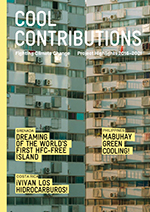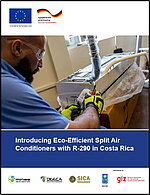Climate-friendly air conditioning in the Philippines

The Philippines is taking its first steps towards climate-friendly room air conditioning.
On 17 May 2018 the Cool Contributions fighting Climate Change (C4) project issued the Philippines’ Technical Education and Skills Development Authority (TESDA) with 10 split air-conditioning (AC) units for use in training a new generation of technicians in the country. Made in India, the units incorporate climate-friendly refrigerant R290 (propane) and inverters and offer maximum levels of energy efficiency. With this initiative, the Philippines is taking its first steps towards climate-friendly room air conditioning.
In cooperation with TESDA, the C4 project has been running a series of train-the-trainer sessions for 32 refrigeration and air conditioning (RAC) training professionals covering the proper use of these new energy-efficient technologies. As a next step, these RAC trainers will cascade what they have learned to their students in TESDA training centres throughout the archipelago. This two-stage training process will lay the ground for the further development in the Philippines of the market for clean and efficient space cooling.

Single (split) room AC units currently generate more than 50% of the Philippines’ overall national greenhouse gas (GHG) emissions from RAC. With space cooling needs continuing to rise in the country, a strategy to reduce GHG emissions from AC has been developed, which focuses on improving the energy efficiency and climate performance of refrigerants at the same time as increasing the energy efficiency of buildings.
The C4 project is working with the Philippines’ Climate Change Commission, Department of Environment and Natural Resources and Department of Energy to develop a sustainable space cooling strategy as part of the country’s Nationally Determined Contribution (NDC). This is timely because, if this issue is not seriously addressed, by 2030 the refrigeration, air conditioning and foam (RAC&F) sector as a whole could be responsible for 13% of global GHG emissions. The transition to green cooling technologies, such as to the highly energy-efficient R290 unit, has the potential to halve these emissions.

Energy-efficient room AC units that use R290 (propane), a low-global-warming-potential refrigerant, offer a climate-friendly alternative to low-efficiency units that use HFC refrigerants, such as R410a or R32, which are now subject to a global phase-down under the Kigali Amendment to the Montreal Protocol. It is recommended that countries take early action to transition their cooling sector to climate-friendly refrigerants, as this will help them to meet their commitments under both the Paris Agreement and the Montreal Protocol in good time.
The C4 project assists partner countries in developing RAC-specific NDC strategies – for more information, consult the policy-makers guide listed below. Since 2016, the project has been implemented by the Deutsche Gesellschaft für Internationale Zusammenarbeit (GIZ) GmbH on behalf of the International Climate Initiative (IKI) of the German Federal Ministry for the Environment, Nature Conservation and Nuclear Safety (BMU).
The link has been copied to the clipboard
Contact
IKI Office
Zukunft – Umwelt – Gesellschaft (ZUG) gGmbH
Stresemannstraße 69-71
10963 Berlin












